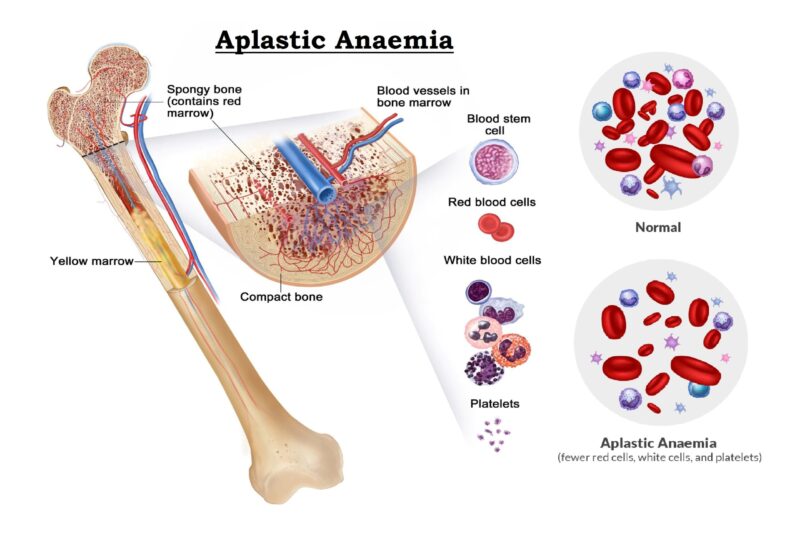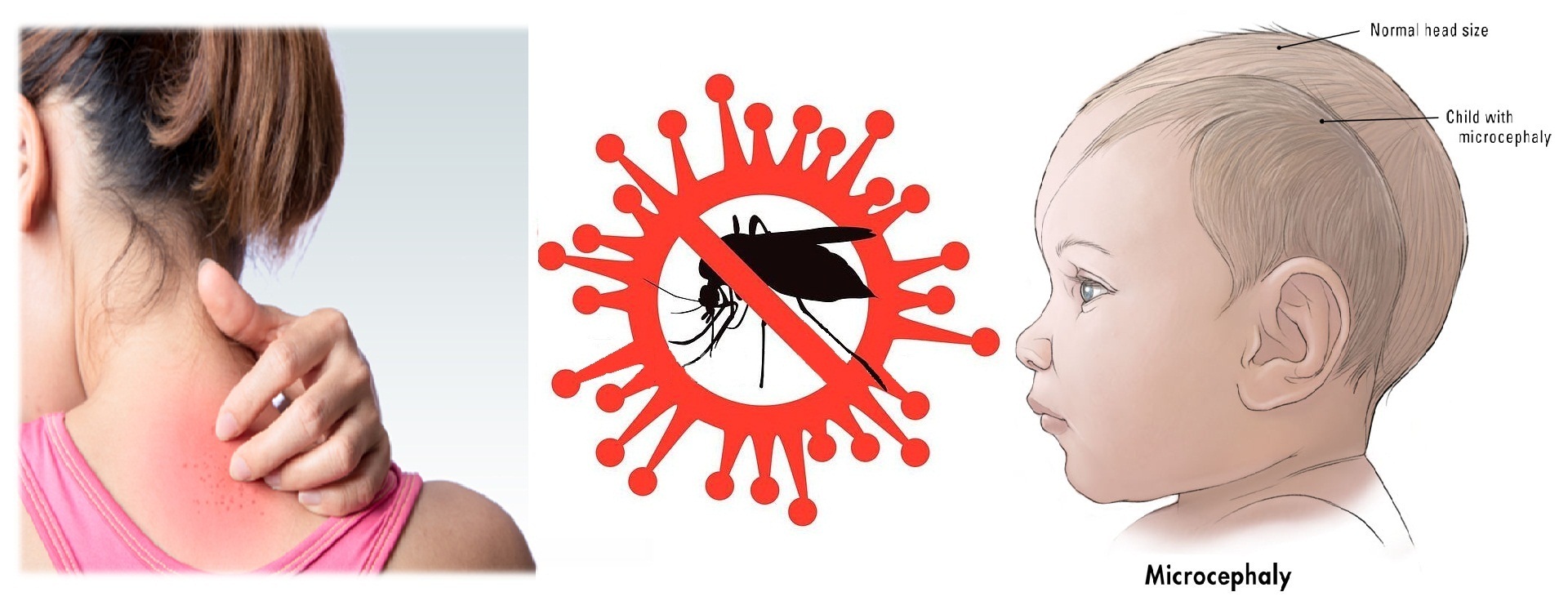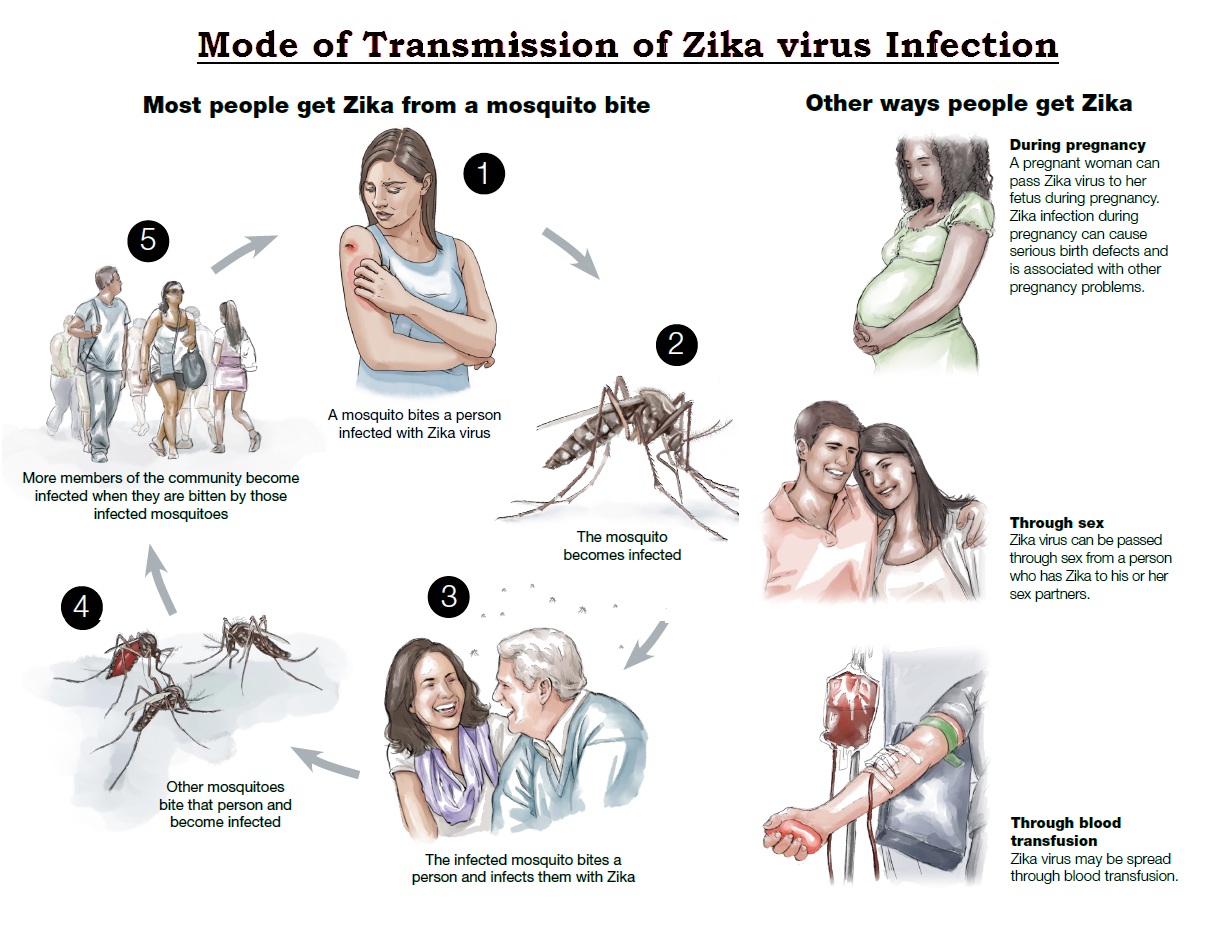Zika virus Infection: Causes, Sign & Symptoms, Mode of Transmission, Diagnosis, Complication, Treatment and Prevention
Zika virus infection is an infectious disease characterized by fever, rash, headache, joint pain, conjunctivitis, muscle pain and or some neurological disorders. Zika virus is primarily spread through the bite of an infected mosquito from the Aedes genus, mainly Aedes aegypti and Aedes albopictus. Zika virus is a member of Flaviviridae virus family. Zika virus infection is also known as Zika fever or Zika virus diseases. For most people, the infection doesn’t cause severe symptoms. However, it can increase the risk of certain birth defects in an unborn child whose mother is infected.
The Aedes genus mainly Aedes aegypti and Aedes albopictus mosquitoes thrive in tropical and subtropical climates. The mosquito picks up the virus when it bites someone who is infected with Zika. Aedes mosquitoes usually bite during the day, peaking during early morning and late afternoon/evening. Zika virus is also transmitted from mother to foetus during pregnancy, through sexual contact, transfusion of blood and blood products, and organ transplantation.
Sign & Symptoms of Zika virus Infection
Most of the people infected with Zika virus doesn’t have any sever symptoms or will only have mild symptoms. However, it can increase the risk of certain birth defects in an unborn child whose mother is infected. The most common symptoms of Zika virus infection are as follows-
- Fever
- Rash
- Nausea
- Vomiting
- Headache
- Muscle & Joint pain
- Malaise
- Conjunctivitis
- Muscle aches
Zika virus infection is usually mild with symptoms, signs of Zika virus infection can appear 3 to 14 days after infection and lasting for several days to a week. People usually don’t get sick enough to go to the hospital, and they very rarely die of Zika. Symptoms of Zika are similar to other viruses spread through mosquito bites, like dengue and chikungunya.
Mode of Transmission of Zika virus Infection
The Zika virus infection is an infectious disease that primarily spreads through the bites of an infected Aedes aegypti and Aedes albopictus mosquitoes. These mosquitoes thrive in tropical and subtropical climates. The mosquito picks up the virus when it bites someone who is infected with Zika. Aedes mosquitoes usually bite during the day, peaking during early morning and late afternoon/evening. Zika virus is also transmitted from mother to foetus during pregnancy, through sexual contact, transfusion of blood and blood products, and organ transplantation.
Diagnosis of Zika virus Infection
To diagnose Zika virus infection, a Healthcare provider will ask about any recent travel and have had any signs and symptoms like Zika virus disease. The incubation period of Zika virus disease is estimated to be 3–14 days. Zika virus has been detected in whole blood (also serum and plasma), Urine, Cerebrospinal fluid, amniotic fluid, semen and saliva. There is accumulating evidence that Zika virus is present in urine and semen for longer periods than in whole blood or saliva.
The testing strategy adopted by laboratories should be determined by the available resources and workflow in each laboratory. WHO recommends the following strategies:
- NAT in patients presenting with onset of symptoms < 7 days. The presence of Zika virus may be confirmed by using Nucleic Acid Testing (NAT) such as RT-PCR to detect targets on the virus genome specific for Zika virus. Laboratories using a panflavivirus assay in combination with gene sequencing, or other conventional molecular methodologies such as multiplex assays for flavivirus detection, are requested to ensure in-house primer sequences have been updated to detect the recent Zika virus lineages
- Serology and/or NAT in patients presenting with onset of symptoms ≥ 7 days. Serology is the preferred method in specimens from patients with onset of symptoms >7 days. Serological testing for Zika virus should only be conducted by laboratories with experience in performing flavivirus serology. Recommended serological assays include
- Enzyme immunoassays (EIAs) and immunofluorescence assays (IFA) detecting IgM antibodies using viral lysate, cell culture supernatant or recombinant protein.
- Neutralization assays such as Plaque-Reduction Neutralization Tests (PRNT). Although PRNT typically provide the greatest specificity, serological assays are subject to cross-reactivity especially in patients with prior flavivirus infection or immunization history.
- IgM detection should be performed for pregnant women in areas of endemic transmission or pregnant women who could have had contact with vector borne or sexually transmitted Zika virus. If further testing is required, the use of comparative neutralization tests can provide higher specificity.
Serological testing is not recommended since antibodies against Zika virus infection persist for years and cross-react with other similar viruses, including dengue. In general, a reactive result for Zika virus IgM in the absence of IgM to dengue or other flaviviruses suggests recent exposure to Zika virus.
Complication of Zika virus Infection
Most of the people infected with Zika virus doesn’t have any sever symptoms or will only have mild symptoms. However few rarely Zika virus infected cases may appear sever complications.
- Zika virus infection during pregnancy is a cause of microcephaly and other congenital abnormalities in the developing foetus and newborn. Zika infection in pregnancy also results in pregnancy complications such as foetal loss, stillbirth, and preterm birth.
- Zika virus infection is also a trigger of Guillain-Barré syndrome, neuropathy and myelitis, particularly in adults and older children.
Research is ongoing to investigate the effects of Zika virus infection on pregnancy outcomes, strategies for prevention and control, and effects of infection on other neurological disorders in children and adults.
Treatment of Zika virus Infection
There is no specific medicine or vaccine for Zika virus infection. Symptomatic treatment may apply to help relieve from symptoms includes-
- Drink plainly of fluids to prevent dehydration.
- Get plenty of rest.
- Take medicine such as acetaminophen to reduce fever and pain.
- Do not take aspirin and other non-steroidal anti-inflammatory drugs (NSAIDS) until dengue can be ruled out to reduce the risk of bleeding.
Prevention of Zika virus Infection
There is no specific medicine or vaccine for Zika virus infection. Precautions to avoid mosquito bites can help to prevent Zika virus infection.
- Avoid mosquito bites by taking the following precautions:
- Use insect repellents.
- Ensure screens are placed over windows.
- Wear long-sleeves and pants or permethrin-treated clothes.
- Empty any items that can hold water both inside and outside dwellings at least once a week. These items include tires, buckets, toys, and trash containers.
- Zika virus Infection can be passed from a pregnant woman to her foetus. Infection during pregnancy can cause certain birth defects. Talk to your healthcare provider if you are pregnant and traveled to an area with ongoing Zika virus transmission. Women trying to become pregnant should consult with their healthcare provider before travelling to Zika virus transmitted areas. If travel does occur, strictly follow steps to prevent mosquito bites during the trip.
- Zika virus Infection can be passed through sex from a person who has Zika virus Infection to his or her sex partners. Zika virus can remain in semen longer than in other body fluids, including vaginal fluids, urine, and blood. Zika can be passed through sex even in a committed relationship.
- Pregnant couples should use condoms every time they have sex or not have sex throughout the pregnancy.
- Anyone not concerned about pregnancy that wants to avoid getting or passing Zika during sex can use condoms every time they have sex, or not have sex. The recommended period of time for taking these precautions will depend on the couple' situation.
Many people infected with Zika virus won’t have symptoms or will only have mild symptoms, and they may not know they have been infected. Zika can also be passed from a person before their symptoms start, while they have symptoms, and after their symptoms end.






